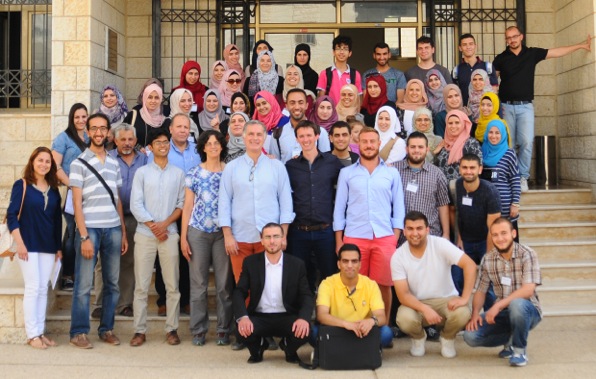
What is Scientists for Palestine (S4P)?
S4P is an international organisation created by and for scientists to support science in the Occupied Palestinian territories and integrate Palestine into the international scientific community.
Our main goal is to pursue projects in science research, education, and entrepreneurship on the ground in Palestine, guided by Palestinian scientists and in collaboration with international Palestine solidarity networks.
At the same time, we aim to raise awareness among scientists of conscience outside of Palestine, to inform them about the challenges of science under military occupation and to provide ways for them to get involved with our activities and Palestine solidarity more generally, and have a direct and immediate impact.
What kinds of activities has S4P done?
We have organised master schools in physics at Palestinian universities, international solidarity and collaboration meetings in the US and UK, online resources and webinars for Palestinian researchers and students, and more. For more details, please explore the links above!
In the long-term we have plans to develop mentorship and exchange programmes and scholarships, and to open local S4P chapters around the world. We are always open to new ideas, so if you have suggestions let us know!
Where did S4P come from?
S4P started in 2015 when a group of theoretical particle physicists in the US and UK decided to create a group dedicated to supporting science in Palestine, to overcome the devastating effects of military occupation on research and education there, and to do so first and foremost by direct action on the ground in Palestine, as well as by developing a support network of scientists around the world, to help overcome the isolation that many Palestinian scientists experience.
Since 2015 S4P has grown to nearly one hundred members in Europe, North America, and Palestine, ranging from undergraduates to emeritus professors. If you are a scientist of conscience and want to get involved, click here for an application form, which you should complete and email it to us.
Who do you count as “scientists”?
We define “science” very broadly, including all “fundamental” sciences like physics, chemistry, biology, etc., and also technology, engineering, mathematics, and medicine (collectively STEMM subjects), as well as social and political sciences like economics, public health, and so on. We aim to be as inclusive as possible!
We also define “scientist” very broadly, including students at all levels (age 18 and up), postdocs, professors (assistant, associate, emeritus, etc.), technicians, teachers at all levels, and of course anyone working in the private sector or government in research and development.
Who can join S4P? What are the conditions for membership?
To join S4P you must agree with the goals of the organisation, be at least 18 years of age, and be a scientist, under the very broad definition given above.
S4P has no membership fees.
Anyone who advocates any form of discrimination, racism, and/or supremacist ideology, including both anti-Semitism and Islamophobia, is forbidden from joining S4P.
Click click here for an application form, which you should complete and email it to us.
What do members of S4P do?
Members are expected to join one or more of our sub-committees. This is where the real work of S4P takes place, on specific projects. Currently we have sub-committees on:
- Schools: organises masters schools in science in Palestine.
- Social Media: The social media subcommittee works to support new and existing initiatives of S4P with targeted promotion through all our social media pages.
- Medical: The Medical Subcommittee is engaged in various activities that aim for supporting public health in Palestine and assisting medical students, graduates and trainees with their career paths.
- Newsletter: The Newsletter subcommittee is composed of S4P members who are interested in promoting S4P’s outreach, mission, and events, as well as providing a platform for members to contribute pitches and articles on matters concerned with Science in Palestine.
- Outreach: organises webinars designed to raise awareness about Palestinian science among scientists outside Palestine, with the long-term aim of developing collaborations with Palestinian scientists
- Webinar support: Webinar support, unsurprisingly, provides support for S4P webinars.
All of our sub-committees have a mix of scientists of many career stages, subject areas, nationalities, and experience with organising and activism. Each sub-committee meets at least once per month, but often more, when things get busy (right before a school or international meeting, for example).
S4P is led by a Steering Committee (SC) of members, elected annually by the full membership. The SC makes high-level executive and strategic decisions, and also monitors the progress of the sub-committees, and SC members often lead sub-committees.
What you get out of S4P depends on what you put into it! The day-to-day work of S4P is entirely member-led. If you have an idea for a project, join a sub-committee–or suggest a new one!
Do I have to be an S4P member to work with S4P?
No! In fact, you don’t even have to be a scientist to collaborate with us! We work with many people in many different capacities. Non-members can and do join sub-committees and work on a variety of projects.
However, members do have some special privileges and responsibilities. Only members can take leadership roles in S4P, such as the (co-)chair of a sub-committee, or member of the Central Committee. Also, only members can attend our general meetings and cast votes there, setting the direction of S4P.
Nevertheless, if you think you have something to offer, be it a new idea for collaboration with Palestine, expertise in a scientific area, experience organising (in science or otherwise), or even if you’re just curious and want to learn more about science in Palestine, please contact us and join the effort!
promote science and support the integration of the occupied Palestinian territories in the international scientific community.
We are also on social media:
